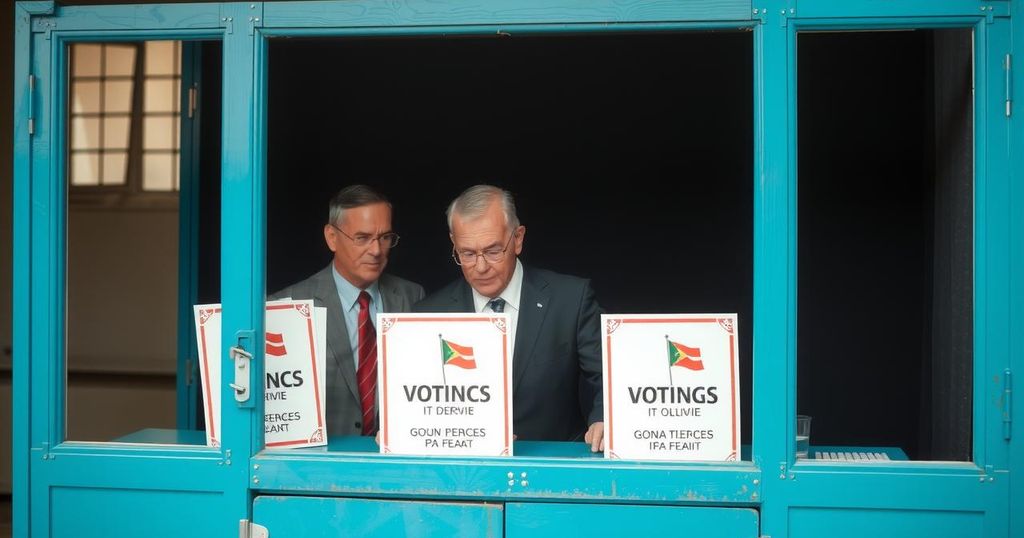World news
ANDRES MANUEL LOPEZ OBRADOR, ASIA, ASSOCIATED PRESS, BOLIVIA, CONSTITUTIONAL COURT, CORRUPTION, CUBA, DEMOCRACY, EL SALVADOR, ELECTIONS, EV, EVO MORALES, GOVERNANCE, LATIN AMERICA, LOPEZ OBRADOR, LUIS ARCE, MEXICO, NORTH AMERICA, PHILIPPINES, SOUTH AMERICA, THE ASSOCIATED PRESS
Jamal Abdullah
0 Comments
Bolivia’s Judicial Elections: A Contest Between Ruling Parties Amidst Growing Disillusionment
Bolivia is set to hold controversial judicial elections, a unique practice allowing citizens to vote for top judges. Candidates attempt to campaign despite restrictions, leading to a contentious atmosphere. Experts criticize the election system for enabling political manipulation and impairing judicial independence. This electoral process reflects tensions between President Luis Arce and former President Evo Morales as they vie for power ahead of the 2025 presidential election. The implications of these elections could influence similar reforms in other nations like Mexico.
In La Paz, Bolivia’s capital, the upcoming judicial elections have spurred controversial campaigning despite regulations prohibiting such activity. Candidates have resorted to creative means of promotion, such as displaying their images on snack packaging, to attract attention amidst a landscape where voters often feel uninformed about the numerous candidates listed on their ballots. Unique to Bolivia, this electoral process, which allows citizens to vote for top judicial positions, contrasts with other countries, marking a significant moment in the ongoing evolution of the nation’s judicial system.
As Mexico prepares to implement a similar judicial electoral process following significant reforms led by former President Andres Manuel Lopez Obrador, parallels with Bolivia’s historical decisions under ex-President Evo Morales are noteworthy. Morales previously initiated this system in 2009 to address corruption and promote democracy in the judiciary. However, many Bolivians perceive these elections as enabling political maneuvering rather than fostering impartial justice, casting doubt on the effectiveness of replacing qualified nominations with electoral contests for judgeship.
Young voters, such as architecture student Marisol Nogales, express their disillusionment with the voting process. “I’ll flip a coin,” she remarked, highlighting the frustration felt by many who face an overwhelming number of names with fleeting recognition among candidates. Critics from both academia and the legal profession caution that judicial elections can entrench ruling party dominance, undermining the principle of an independent judiciary.
Francisco Vargas, vice president of Bolivia’s electoral tribunal, acknowledged the contentious nature of the elections, stating that what should be a straightforward process has devolved into a litigious and controversial affair. Recent electoral developments have further complicated the situation, as a procedural delay instigated by the Constitutional Court—composed of allies to current President Luis Arce—has intensified political rivalries between Arce and Morales as they both gear up for the 2025 presidential contest.
Despite the criticism levied against the electoral process and its implications for judicial independence, the elections are finally scheduled to proceed, albeit as a partial election that only fills four of the nine positions on the Constitutional Court. Political analysts like Paul Coca assert that this limited electoral opportunity offers a glimpse into how the judiciary has transformed into a powerful entity wielding significant influence over Bolivian governance.
Bolivia’s judicial elections have historically seen low voter turnout, with citizens often opting to submit blank or null votes as a form of protest against the perceived lack of transparency in candidate selection. This sentiment echoes past incidents where voters rejected Morales’ pursuit of extended presidential terms in a 2016 referendum, which later led to his controversial return to power through a ruling by the Constitutional Court on “human rights.”
As Bolivia approaches its third instance of judicial elections, the outcomes remain uncertain. Mexico’s newly elected President Claudia Sheinbaum is closely observing the situation, ready to analyze the ramifications for her nation following the judicial restructuring she has inherited from Lopez Obrador. This interaction between countries could significantly shape the future of judicial governance in the region.
Bolivia’s unique electoral system for judicial positions has become a focal point for discussions on democracy and judicial independence. In a broader context, Bolivia’s recent history is marred by political rivalry and controversies surrounding the independence of its judiciary, raising critical questions about the efficacy of electing judges. The political dynamics between President Luis Arce and former President Evo Morales underscore a struggle for control over the judiciary, especially with the upcoming presidential elections in 2025. This intricate landscape provides a backdrop for understanding the significance of Bolivia’s electoral process for judges, particularly as other countries, like Mexico, are poised to follow suit in offering similar systems for judicial appointments.
Bolivia’s judicial elections represent a contentious intersection of politics and justice, raising serious concerns over the independence of the judiciary and the role of political influence in such elections. With the outcome of the elections impending, and the eyes of other nations like Mexico upon it, the implications of Bolivian judicial electoral practices could resonate widely, potentially shaping future reforms elsewhere. As citizens grapple with distrust and disillusionment, the need for transparency and genuine democratic processes in judicial appointments has never been more crucial.
Original Source: www.voanews.com




Post Comment